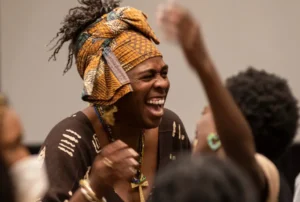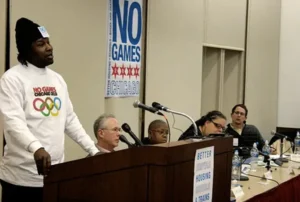January 18, 2015; New York Times
Continuing the line of exploration about reclaiming the meaning of Martin Luther King, Jr. Day—and reclaiming the legacy of Dr. King himself—that NPQ published yesterday and over the last couple of weeks, we note this piece by Tanzina Vega in the New York Times. The article suggests that “reclaiming” MLK Day from the sanitized, homogenized version of the holiday that has been promoted for many years may be a little off-base, in that Dr. King’s civil rights protests originated in “an era when he was confronting legalized discrimination, and communication tools included mimeographed fliers and the holy grail of a network television report.” Today, according to Vega, “Protesters today cite myriad ills embedded in the economy and culture and spread their messages instantly through websites, Twitter hashtags and text messages.”
The specific difference that Vega identifies is “whether [unlike Dr. King and his allies] today’s protesters have the ability, or even the intention, to build an organized movement capable of creating social change.”
Sign up for our free newsletters
Subscribe to NPQ's newsletters to have our top stories delivered directly to your inbox.
By signing up, you agree to our privacy policy and terms of use, and to receive messages from NPQ and our partners.
In the Vega article, King biographer and historian David J. Garrow suggested that today’s protests, Ferguson-originated and otherwise, aren’t comparable to the strategies of civil rights protesters in the 1960s. “You could call it rebellious, or you could call it irrational,” Garrow said, referring to today’s protests that are trying to reclaim the legacy and tradition of Martin Luther King, Jr. “There has not been a rational analysis in how does A and B advance your policy change X and Y?”
“Occupy had a staying power of, what, six months?” Garrow observed, comparing the Ferguson and other protests to the Occupy Wall Street movement. “Three years later, is there any remaining footprint from Occupy? Not that I’m aware of.” Garrow’s sentiments track in some ways Oprah Winfrey’s critical comments about the current wave of protesters.
There may be pros and cons to both sides of the argument, but we offer the following issues for readers to debate:
- Changing political focus: In Dr. King’s era, the purpose and challenges of the marches and civil disobedience, as Garrow points out, were sharply focused on momentous issues, small and large—whether that was to be able to sit and eat at an otherwise segregated lunch counter or to be allowed to vote. Does the fact that today’s issues are more diffuse and not directed at legal impediments specifically aimed at black people—ending economic and educational disparities, curbing police violence, and confronting institutional and structural racism in our society—make today’s protests any less legitimate, any less worthy of support, and any less entitled to adopt the mantle and strategies of Dr. King?
- Commitment: Characterized as a representative of the “respectability politics” of the civil rights movement, Rev. Al Sharpton is quoted in the article as noting about some of the protesters, “I think some of them are hustling the media; they have no real following, no real intent, and they may not be around in four months.” Some people might have at one time (and even now) thought of Sharpton as working a hustle, but does the presence of people in the protests who aren’t in for the long haul and, perhaps, are adopting the tools of civil disobedience for self-aggrandizement and ego gratification make today’s protests any less “respectable” than those of our nation’s civil rights icons?
- Degrees of radicalization: When Dr. King led parts of the civil rights movement, he wasn’t always followed in lockstep by other leaders. Memories of Stokely Carmichael, H. Rap Brown, and Malcolm X suggest that other activists found Dr. King’s approach to be too gradualist and too prone to accommodations with the powers that be. Aside from the clear hucksters that are riding the Ferguson and other protests for other purposes, does the inclination of some to adopt more overtly disruptive strategies of civil disobedience than many people might be comfortable undermine the movement, or simply reflect the diversity of people concerned about racism and police violence in the wake of the killings of Mike Brown and Eric Garner?
The test is going to be in the next few weeks for sure. The “hook” of MLK Day served as a strategic anchor for protests around the nation. Without the hook, how will the movement continue and evolve, and what will it achieve?—Rick Cohen












